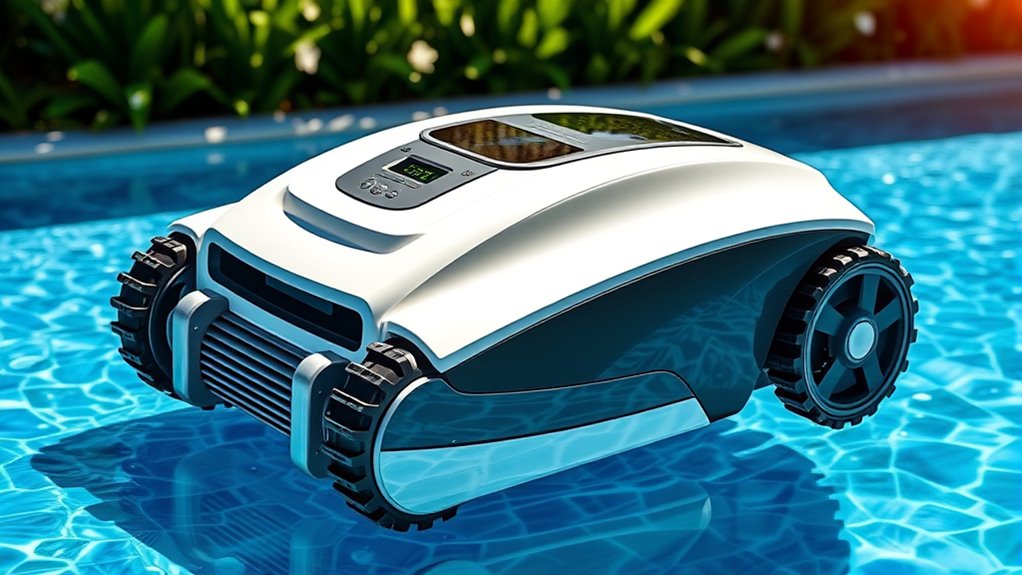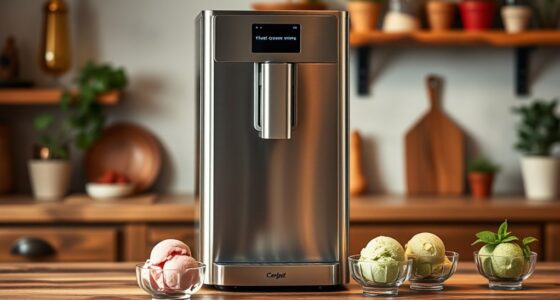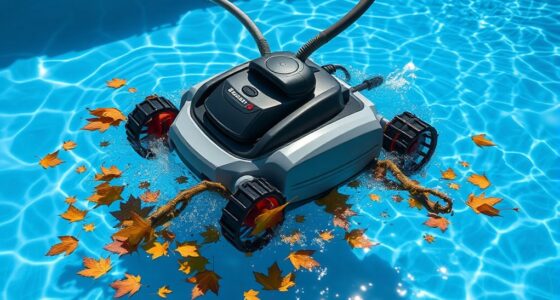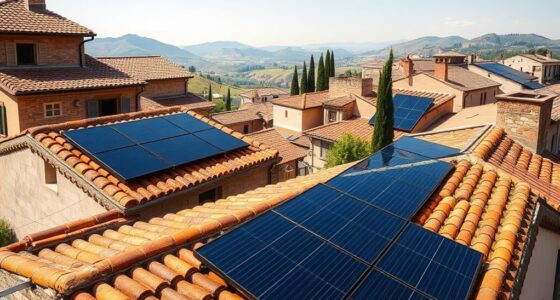When buying a robotic pool cleaner, focus on its energy efficiency to save on power bills and reduce environmental impact. Check noise levels to ensure it operates quietly around your outdoor space, and consider its navigation ability for your pool’s size and shape. Ease of use and maintenance are key for hassle-free cleaning, while extra features like programmable schedules and app control help boost convenience. Keep these factors in mind to find the best fit—there’s more to discover as you explore further.
Key Takeaways
- Assess pool size, shape, and complexity to select a cleaner with appropriate navigation and coverage features.
- Prioritize energy efficiency to save on electricity bills and reduce environmental impact.
- Consider noise levels for quieter operation, especially for early morning or late evening cleaning.
- Ensure ease of use and maintenance with straightforward controls and accessible filters or brushes.
- Look for programmable schedules and remote or app control for added convenience and automation.
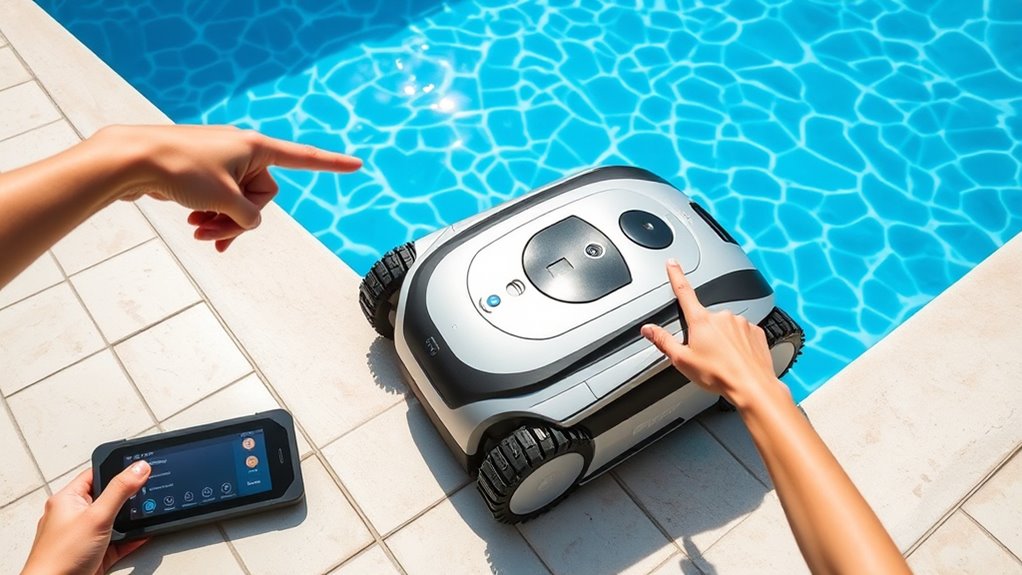
Choosing the right robotic pool cleaner can considerably simplify your pool maintenance routine. When you’re shopping for one, it’s vital to consider how energy efficient it is. An energy-efficient model not only reduces your electricity bills but also minimizes the environmental impact. Look for units with good energy ratings or those that are designed to operate using less power while still delivering effective cleaning. These models often feature advanced motors or smarter cleaning algorithms that optimize their operation, ensuring they don’t run longer than necessary. Additionally, energy-efficient cleaners tend to generate less heat and wear on their components, which can extend their lifespan. Incorporating energy-saving features into your decision can significantly enhance the sustainability of your pool maintenance. Proper technological integration can also improve overall cleaning performance. Noise levels are another critical factor to think about. A noisy robotic pool cleaner can disrupt your peace, especially if your pool is close to living areas or bedrooms. Thankfully, many modern models are built with quieter motors and sound-dampening technology. When evaluating options, check reviews or product specifications for noise level measurements, ideally in decibels. A cleaner operating at a lower decibel level won’t disturb your outdoor relaxation or nearby neighbors. Quiet operation is particularly valuable if you prefer running the cleaner during early mornings or late evenings when noise might be more noticeable. Beyond energy efficiency and noise levels, consider the size and shape of your pool. A larger or irregularly shaped pool might require a more sophisticated cleaner with better navigation capabilities. Some robotic cleaners are equipped with mapping technology or multiple brushes that adapt to different surfaces, ensuring thorough cleaning regardless of pool complexity. Also, check the cleaning path and coverage—models that can systematically cover every inch of your pool save you time and effort. Another aspect to consider is the ease of use and maintenance. Choose a model with straightforward controls and easy-to-remove filters or brushes. Regular maintenance ensures your cleaner keeps working at peak performance and prolongs its lifespan. Compatibility with your pool’s shape and surface type is also vital; some models work better on vinyl liners, while others are designed for concrete or fiberglass pools. Additionally, proper maintenance can prevent common issues and extend the device’s lifespan. Being aware of pool surface types can help you select the most suitable model for your needs. Finally, think about the convenience features. Features like programmable schedules, remote control, or app connectivity can make your cleaning routine more flexible. These allow you to set cleaning times that fit your schedule, ensuring your pool remains pristine without manual intervention. When you evaluate these factors together, you’ll find a robotic pool cleaner that not only meets your cleaning needs but also operates efficiently and quietly, making your pool maintenance effortless and more enjoyable.
Frequently Asked Questions
How Long Do Robotic Pool Cleaners Typically Last?
Robotic pool cleaners usually last between 3 to 8 years, depending on usage and maintenance. You should consider the battery lifespan, as batteries typically need replacement after a few years of regular use. Also, check the warranty coverage—many models come with warranties that protect against defects and early failures. Proper care and timely part replacements can extend your cleaner’s life, ensuring it keeps working efficiently for years.
Are Robotic Pool Cleaners Suitable for All Pool Types?
Think of a robotic pool cleaner as a versatile artist, capable of working on many surfaces. Yes, they’re suitable for all pool types, but your pool’s shape and material matter. For irregular shapes or textured surfaces, choose a model with adaptable navigation and strong brushes. For concrete, vinyl, or fiberglass pools, most cleaners work well. Just pick one that matches your pool’s unique features, and you’re good to go.
What Maintenance Is Required for Robotic Pool Cleaners?
You need to regularly maintain your robotic pool cleaner to make certain it works efficiently. This includes replacing the filter when it gets clogged or dirty and performing software updates if available, which can improve performance and fix bugs. Additionally, check the brushes and wheels for wear, clean the unit after each use, and store it in a dry place. Proper maintenance keeps your cleaner running smoothly and extends its lifespan.
Can Robotic Pool Cleaners Handle Large Debris?
Robotic pool cleaners can handle large debris if your pool size aligns with their debris capacity. Check the cleaner’s debris capacity to guarantee it can manage leaves, twigs, and other sizable items. Larger debris containers are better for bigger pools or pools with lots of debris. Keep in mind, some models are designed specifically for heavy debris, so match the cleaner’s capacity to your pool’s needs for peak performance.
Are Robotic Pool Cleaners Energy-Efficient?
Robotic pool cleaners are generally energy-efficient, helping you save on electricity bills. They use low energy consumption technology, which makes them eco-friendly. Many models come with eco-friendly features like optimized cleaning cycles and energy-saving modes, reducing power use without sacrificing performance. By choosing a robotic cleaner with these features, you not only keep your pool spotless but also minimize your environmental impact.
Conclusion
As you choose your robotic pool cleaner, picture it gliding effortlessly across your sparkling water, silently tackling every corner. Think about its navigation, scrubbing power, and ease of use, ensuring your pool remains crystal clear without hassle. The right cleaner becomes your pool’s best friend, working tirelessly while you relax by the shimmering surface. Make your decision with confidence, and soon you’ll enjoy a pristine pool, inviting you to plunge into invigorating, clean waters anytime.
